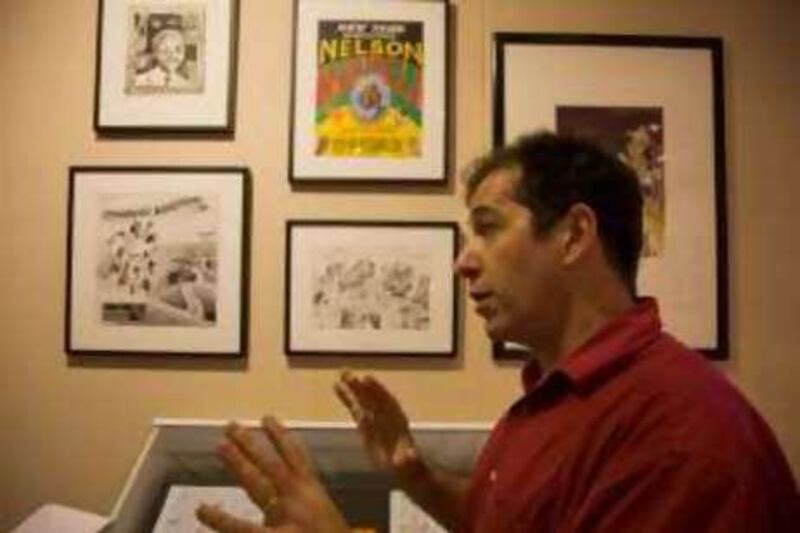Johannesburg // Entertaining, sharp and sometimes critical, the walls of the Nelson Mandela Foundation's exhibition space in Johannesburg are currently playing host to drawings of the icon by South Africa's top political cartoonist, Jonathan Shapiro. Mr Shapiro, 50, who is known as Zapiro, has been in this business for decades, and the images begin from the time when Mr Mandela was still in prison - although under apartheid showing him was a challenge.
"Mandela was banned and banned people were not allowed to be depicted at all. We weren't allowed to draw them," he said, adding apartheid's "horrendous system" had echoes of the Soviet Union, "when people were airbrushed out". "There were no photographs. It was the most strange, Kafkaesque situation." Instead, he worked from banned books that he found in a university library, and old pictures dating from before Mr Mandela was jailed in 1963.
An activist before he became a cartoonist - an ANC branch in Cape Town is named after his mother, Gaby - Zapiro himself was arrested at least twice and once spent 11 days in detention. At one point, when he was being sought by security police, he was warned not to return to his home in Cape Town. "I was in hiding for a couple of weeks. I adopted a disguise and dyed my hair blonde and grew a goatee and wore geeky glasses.
"I felt the cops knew everything and they knew nothing and you didn't know which you were going to get," he said, although he added he was to some extent protected by his white skin. Finally, Mr Mandela was released, and the country held its first democratic election in 1994. The night before, Zapiro drew an image of Mandela as a sun rising over a dustbin holding the old South African flag. "It was just fantastic," he said. "It was so exciting."
In office, though, the realities of political authority inevitably gave rise to occasions when Zapiro felt he had to criticise Mr Mandela. After Mr Mandela appointed Allan Boesak, a former anti-apartheid cleric who was facing corruption allegations, as ambassador to Switzerland he drew a picture of "St Rolihlahla [Mandela's middle name] the Righteous" with his halo slipping. At other times he condemned Mr Mandela for not speaking out against human rights abuses in Nigeria and Indonesia.
"Sometimes I feel a bit embarrassed," he said. "It was difficult to know how to pitch the criticism." But the fact that those very same images are being displayed at the foundation is symbolic. "They support the fact that he's not to be treated as a saint," Zapiro said. "He doesn't want to be treated as a saint. Where there's criticism that could be levelled and should be levelled, it should be. He recognises the role of the critic."
When Zapiro's first book of cartoons came out in 1996 he asked for a comment from the then president, who said it was "very exciting and quite accurate", even though the images were becoming more critical of the ANC and the government. In a telephone conversation, Mr Mandela told him he was only doing his job. "That was the most accurate acknowledgement of the role of the cartoonist and the critic and the satirist that I have ever heard from a head of state, and who else is there of his stature?" he said.
It is a stark contrast to the current political authorities in South Africa. Jacob Zuma, the ANC leader, is suing Zapiro for defamation, demanding two million rand (Dh734,000) in one case and seven million in another. Zapiro always shows Mr Zuma, who has corruption allegations hanging over him, with a shower nozzle coming out of his bald head, a reference to the 2005 trial in which he was acquitted of raping an HIV-positive woman but said he did not use a condom and showered afterwards to prevent transmission of the virus.
Mr Zuma is claiming "injury to his dignity", and Zapiro said: "I challenged him after he sued me. He spoke at Cape Town Press Club and I said to him, 'Isn't it obvious that your commitment to free speech is just lip service and what you are actually trying to do is intimidate journalists by using legal steps?' " When Mr Zuma told him he thought the cartoons were damaging to his reputation, he responded: "Would that be your reputation as a disgraced, chauvinistic demagogue who can't control his sexual urges and who thinks a shower prevents Aids? Isn't it obvious you have done the damage to your own reputation?"
Comparing Mr Mandela with some of the figures who have come after him, particularly Thabo Mbeki, his successor as president, and Mr Zuma, Zapiro said: "One of the levels they don't hold up with him is their understanding of satire. I think Zuma pays a lot of lip service to a lot of things, including free speech. "There have been times when he talks in a very hurt kind of way about how he feels, yet he's the powerful politician who intimidates the much less powerful."
sberger@thenational.ae





